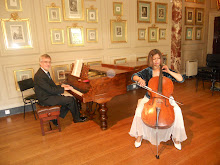Tuesday, 22 February 2011
The 'Music as Food for the Brain' debate
We are now in 2022 and I still standby what I wrote here in goodness me 2011.Deep research done in USA on the benefits of music education on the mind.
I feel obliged to put this information before you. I have gleaned it from the internet and I am not claiming authorship in anyway but I believe that it is a worthwhile area to bring to your attention and I wonder what you might think from the research done by an august set of scientists and summarised by Wendy Harris writing under the title of 'Childrens Music Workshop and Music Education Online that I have reproduced here and I hope that I have by quoting the pros and cons or rather the qualifying statements she has written about, given a balanced overview of the scientific accumulated current opinion on the subject as formulated and stated by Ms. Harris.
There is an interesting debate still raging and yes as stated in my previous paragraph, it is on the internet too and that is about Music making you smarter' Indeed there is a music shop not nine miles from me that has adopted this wonderful statement as part of its publicity for the sale of instruments and sheet music.I have read a great deal on the subject and although I am inclined to agree that good practise takes on the air of the laboratory and certainly involves problem solving and solution finding.This is especially in the area of objective appraisal of ones work and with the process of finding decent fingerings for passages.However, neuroscientists have found that in performing musicians that the membranes that connect the left and right sides of the brain are thicker and thereby the interaction between those parts of the brain is heightened.
Harris shows in her paper that in the primary and secondary educational level the falacy about children missing out to leave classroom lessons to go for instrumental lessons is also spurious as it has been found in research in the USA that children who leave class to go to lessons are in fact getting higher marks in tests and are not lagging behind.
Harris has observed that the overall sweeping statement that children are smarter who learn instruments has been agreed by certain psychologists but also it has been noted that schools in the USA that have strong music programmes i.e instrumental lessons and general music singing etc, have better exam results over all. Even more stunning information was made about medical students the highest grades all had some musical abilities.
Harris has taken the Music and brain research of Professor Donald A.Hodges Covington Distinguished Professor of Music Education and director of the Music Research Institute at the University of North Carolina at Greensboro, and has demonstrated his findings which are 'that music activity takes place in the right hemisphere of the brain, the activity occurs with equal vigour in the left rational hemisphere.Music is both emotional and intellectual activity.'
Wendy Harris states that Hodges is also notable for stating that in the superficial sense music does not make a person smarter but continues to state that in 1993 experiments claimed that listening to a Mozart Sonata would make your IQ increase by eight points.She continues outlining that through subsequent work Hodges explained 'proved that such listening would sharpen a subjects spatial-temporal relationships momentarily.After a short while, the subject would go back to being just as smart as before or dumb. A rich environment makes a difference. The slogan was used Use it or Lose it (referring to the brain)The more education you have ,the more the interconnections in the brain. Music changes the brain.'
Harris also cites Patricia De Corsay,Co-ordinator of Lawrence University's Early Childrens Music Programme in Appleton, who was aware over a number of years that 'with the introduction of music to children many areas of the brain were benefitting like the mathematical language centres. Music was seen as a super-advantage.The Lawrence classes led by trained professional musicians introduce basic music concepts and give hands on experience for children to play with a variety of folk, instrumental and percussion instruments.
She continues stating,Hodges further discusses brain activity in performance and states that during performance there is no activity in the front lobe where conscious thought takes place.'In other words performance is not a thinking activity.All the thinking takes place earlier.Performance can be seen as being similar to the activity of a highly trained athlete. Music is always a physical activity. Musicians are small muscle athletes.
This very observation relating to musicians being small muscle athletes I have taken as dictation in William Bruce's class for The London Cello Society the observations are published on the internet.
Reference and Bibliography 'Summary' by Wendy Harris Childrens Music Workshop and
Music Education Online
Subscribe to:
Post Comments (Atom)




No comments:
Post a Comment